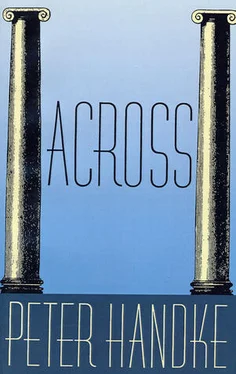In the autumn, they drain the canal and keep it dry for a month; during this time, it is cleaned and the banks are reinforced; the fish are moved elsewhere. The muck stinks. In places, the bed is completely dry, like a wadi. But one fine day the water flows again, muddy, gray, full from top to bottom with odds and ends that have accumulated during the dry period. After exclaiming with surprise that the water is back again, an old woman says: “And how filthy it is!” But adds: “As it should be.”
A few of the planks on the bridge have been replaced; for a long while the new planks remain lighter-colored than those around them. Earlier than elsewhere in the vicinity, ice appears in the cracks; later on, it bulges glassy from the clefts in the willow trees. The large, lobed leaf of a plane tree has blown from far off against the trunk of a willow, and there it stays, converted into a special kind of trail marker. One winter’s night, seen from the top of one of the “city mountains,” the streetlamps along the twisting, turning canal become the most prominent constellation on the plain. Seen from a distance, the meanders twinkle like stars.
The haze that rises continually from the water makes for a distinct zone on either side of the canal; the houses in the Colony, on this side of the veil, become a separate community, with, as its emblem, the old-fashioned wooden wheel which sporadically waters the gardens along the bank. On the far side of the bridge, the pedestrians have arrived, so to speak, on their home ground; up until then, they all goose-stepped on one side of the road, whereas now they band together or scatter as in a kraal or a cattle pen. Immediately after the last plank, a youngster on a bicycle lets go the handlebars and rides home with folded arms. The next rider, whose bicycle lurches and rattles as though on the point of falling apart, alights on the bridge, takes a look at the frame, says aloud to himself: “Oh well, it ought to get me home,” and lurches on.
The “bridgeman,” also known as the “duty officer” or the “census taker,” is inconspicuous; asked what he’s doing there, he may answer: “I’m waiting.” Waiting, he walks back and forth over the planks, or leans on the railing, propping one heel on the crossbar behind him. He watches as a student driver practices turning at the edge of the bridge. The engine of a parked bus is revving up. The trees of the plain are thinned by the fog. The many black mistletoe balls in their crowns, and beside them, the resplendent full moon. The icy mountain water in the canal cools the heartbeat. At one moment, as he stands here, he is: “I am.”
This bridge, he thinks, is so small, there will never be any need to blow it up for strategic reasons. A flag will never be unfurled on it. Under the weight of a tank, it would collapse instantly. Nor is nature likely to show its violent aspect here; in case of flood, the sluice gate on the Ache — where the canal begins — would just have to be closed.
In the Sunday-morning sun, a woman in an advanced state of pregnancy and a young fellow, holding each other by the hand in the middle of the bridge, dance in the presence of the slow current at their feet — dance the pregnancy dance. One night, instead of the usual colored washing in the garden of the lockkeeper’s house, where a family of foreigners live, nearly all the washing is white. The viewer finds an unusual word for the activity of the water, the trees, the wind, the bridge: “The canal, the light, the willows, the planks of the bridge — they prevail.”
A chirping in the wires means that a bus is coming. Ordinarily, one of the alighting passengers hurries ahead of the rest and one lags behind. In the summer, when the passengers jump off the running board in their bright-colored clothes, they look like tumbling ninepins or a riotous band of red-, white-, and brown-skins; in the winter, disguised in their dark clothing and lit by the arc lamps at the turnaround, like refugees or pilgrims. (On this score, we are one with the red Indians.) In batches, they hurry across the little bridge. Not all the homecomers swing their bags like that child now. Rarely does one of the walkers stop and look down at the water (at the most, someone will set his burden down for a moment or shift it to the other hand); a few tap their sticks or umbrellas on the planks. Seldom does one of the bridge crossers curse, grumble, or laugh; but once in a while you hear a narrative note: “When my father …” A squeaky shopping cart; a springy baby carriage; a purring electric wheelchair. Then a little stage business: two schoolboys take advantage of the bridge for an exchange they have just agreed upon in the bus, while an adult, after tossing his coin in the box, takes a newspaper out of the plastic bag fastened to the railing. An old woman doubled up with gout stops on the hump of the bridge and squints up at the weather. “Smarty up there does just what he pleases.”
The laggard is a young woman; the many different-colored clips in her pinned-up hair glitter and sparkle as she crosses the bridge.
For a moment, the empty bridge is suffused with feminine perfume.
After an interval comes a horse-drawn carriage adorned with garlands and crowded with musicians on their way from one performance to another; they have put their clarinets, trumpets, and cymbals aside and look tired; only the accordion player, who is sitting on the back of the shafts with his instrument in the crook of his arm, opens the bellows on the bridge, producing a long-drawn-out tone.
Now from the medieval canal — as from the medieval figures over the doors of the Old City churches — now peace, mischief, quietness, gravity, slowness, and patience.












